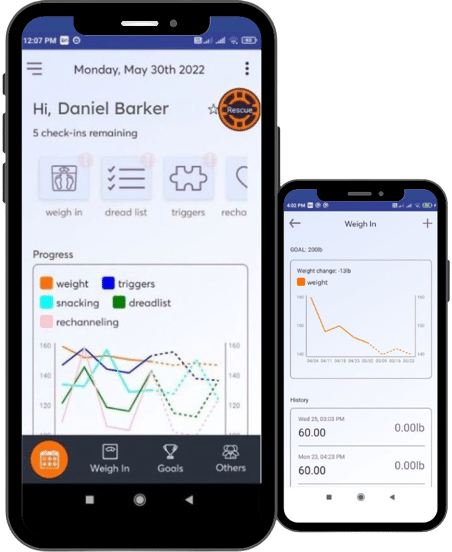Resisting Cravings: Lessons From the BrainWeighve App

In the past two weeks, we’ve been exploring many topics on AddictionNews related to the sources of anxiety and the efforts to head off substance use disorder by helping children build resilience.
There is a lot that can be done to help children increase delay discounting, resist urges, and improve self control. We have focused on Parent-Child Interactive Therapy (PCIT). PCIT is a program to teach parents and caregivers how to read an infant’s signals and how to soothe upset babies. PICT can be initiated during pregnancy, before the child is born.
PICT results in a significant decrease in parent and caregiver stress levels and a measurable decrease in infant upset incidents. By reducing the bath of stress chemicals cycling through a newborn’s brain, infant anxiety is reduced and confidence is strengthened.
In school, there are learning games that have been proven to reduce stress, improve social behavior, and increase delay discounting, which is the amount of time a child is willing to wait for a reward. As children get older, programs such as LifeSkills Training have a better track record at delaying substance use than programs such as D.A.R.E.
LifeSkills training is delivered in three age levels: elementary school, middle school, and high school. The modules teach self-control and self-restraint by teaching children how to handle peer pressure, how to de-escalate conflicts, and how to recognize manipulative advertising. They encourage episodic future thinking with lessons on goal setting and time management. LifeSkills Training strengthens self-management by teaching decision-making and problem-solving skills.
And yet some children still struggle with stress and anxiety and substance use issues. What can be done to help these children cope with environmental stress without resorting to substance abuse? In this case, the biggest substance of abuse is food, one children struggle with more than any drug.
Enter the BrainWeighve app. BrainWeighve is a self-directed weight reduction app developed for morbidly obese teenagers. The app is the result of decades of research into childhood obesity by Dr. Robert E. Pretlow, MD, MSEE, FAAP, a pediatrician, electrical engineer, and Fellow of the American Association of Pediatricians. Dr. Pretlow is also the publisher of AddictionNews, broadening his scope from eating addiction to other behavioral and substance use addictions.
BrainWeighve is based on years of listening to kids talk about obesity. An internet pioneer, Dr. Pretlow created a safe online forum for kids to anonymously air their thoughts about why they are overweight and what to do about it. The forums are moderated by medical professionals, and were consolidated into the book, Overweight: What Kids Say.
The strategies learned from these online forums informed Dr. Pretlow’s first attempt at a weight loss app, W8Loss2Go. After a successful trial, W8Loss2Go became BrainWeighve, a weight loss app clinically proven to help people take off weight and keep it off. How does it do it? In many ways, BrainWeighve provides cognitive behavioral therapy (CBT) in a bot.
BrainWeighve works because the patient does most of the work and gets most of the credit, strengthening their self-esteem as progress is made. Patients begin by creating a list of stressful situations — a “dread list” — which is itself a stress-inducing process of thinking through what is dreaded about school life, work life, and home life.
The dread list is followed by a series of action plans. The patient makes a plan for how to handle each of these situations without resorting to binge eating. The app then breaks down the habitual triggers that tend to initiate binge eating episodes: hooks, problem foods, food sensations, and celebrations. Action plans are made for every trigger.
The action plans are based on rechanneling stressful energy into a non-food activity. They can be as simple as holding your breath or squeezing your wrists — anything that delays indulgence builds resilience. Patients input their own strategies for dealing with stressful situations, but they can also choose from dozens of suggestions provided by other users and vetted by medical staff.
Once BrainWeighve is set up, patients withdraw from one problem food at a time, for 10 consecutive days. Just like a drug, patients may experience sharp feelings of withdrawal at first. However, if they stick to their action plans, they soon do not miss it and move on to the next problem food. This gradualism builds confidence and a skill set to resist any problem food over time.
These are the elements BrainWeighve uses to build resilience:
- Self-directed: the patient is in charge every step of the way.
- Awareness: of the situations that cause binge eating.
- Planning: patient-made strategies for how to handle every urge.
- Community: access to monitored forums with other users.
- Measurement: goal setting and daily monitoring.
- Updates: daily check-in on triggers and action plan updates.
The BrainWeighve app can also be connected to a doctor, coach, or therapist with whom you can exchange secure messages. This app takes everything we know about resisting urges and builds it into a handheld helper that can change the way you think about the way you eat.
BrainWeighve is currently recruiting for a clinical trial at the UCLA Medical Center for overweight teens aged 14-21.
Written by Steve O’Keefe. First published September 4, 2025.
Image Copyright: BrainWeighve, used with permission.




